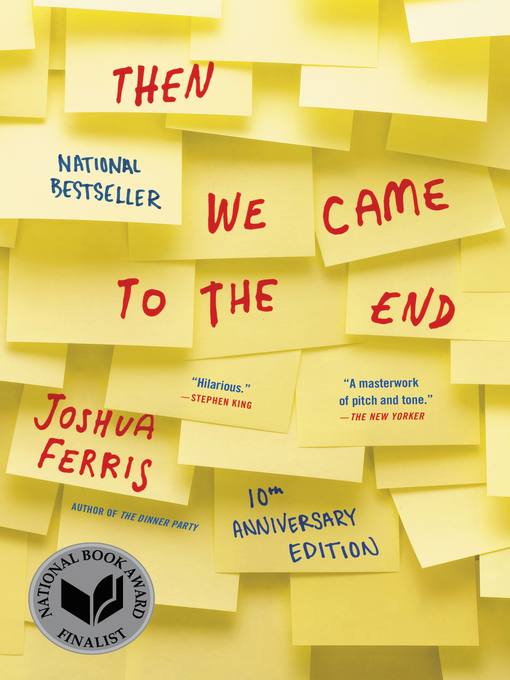
Then We Came to the End, by Joshua Ferris, is the only book I have ever read that is narrated in second-person plural. I don't actually know if second-person plural is a real term, and if so, if it is the correct term to describe the narrative form of this novel. But whatever it is called, it is unique and the standout aspect of a standout novel.
Then We Came to the End describes the office life of a Chicago advertising agency over a year or two around the turn of the century, a time, apparently, of a huge economic come down and bubble burst (which obviously does not give the novel any added relevancy). The book follows a group of copywriters and art directors and their bosses and security guards as they deal with their personal and professional lives under the constant threat of being "Walked Spanish" (their Tom-Waits-derived slang for being fired) by possibly cancer-ridden supervisor Lynn Mason. The book has insight into both the collective and individual minds and pysches of these very human characters, but is, as mentioned above, told (save for a brief middle interlude) in a narrative style that begins most phrases with "we", as in "we stared at our computers, debated going to the coffee bar, played with our staplers. We waited for Benny to wander by and tell us a story, or we feared hearing Tom Mota swear at the top of his lungs" etc etc (I made those lines up, though that is indicative of the style). The man or woman behind the "we" (if there is one) is never revealed, and thus the reader is implicated as part of the collective, while simultaneously being able to view the group as a cohesive unit outside of themselves. Its a neat trick, and one that may have been extra resonant for me. While I claim to know almost nothing of the exact emotions and crises of these characters, I did work for three months as a temp in a Chicago advertising office, that, while probably not the one this novel is based on, had eerie similarities (DDB, where I worked, also occupies three stories in a large downton building off Michigan Ave., a similar cafeteria, and similar internal stairs etc). While I wasn't there long enough or important enough while there to form the kinds of bonds the book deals in, I recognize the kinds of time-wasting and collective feeling, remembering most specifically my cubicle-neighbor Alexandra's implorement for me to "just talk to her about anything" at the end of long days, or the inexplicable dread and embarrasing elation of seeing my other cubicle-neighbor let go at the end of my third week. Then We Came to an End is a hilarious look at human beings, but especially the human beings who work in small offices, in front of computers, under bosses they don't know how to treat, with people they either are in love with or can't stand or both, and who feel guilty about not doing work they don't really want to do. In other words, its a book about and for most of us. We all would enjoy it.
1 comment:
Isn't that 1st person plural?
Post a Comment